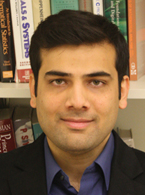Zeeshan Syed Awarded a DARPA Young Faculty Award

 Enlarge
Enlarge
Zeeshan Syed, Assistant Professor of Computer Science and Engineering, has been awarded a Young Faculty Award (YFA) from DARPA for his research project, “Computational Neuromarkers.” The DARPA YFA is intended to identify and engage rising research stars in junior faculty positions in academia, and provide high-impact funding in order to develop their research ideas.
Prof. Syed’s research aims to discover novel markers for screening mental health conditions such as bipolar disorder and schizophrenia using sophisticated computation to extract information in physiological signals that is often difficult to visualize directly. With many common mental health conditions chronically underdiagnosed due to the lack of accurate blood- or imaging-based tests for screening, Prof. Syed’s work focuses on creating tools that can be used to robustly diagnose patients and to match them to personalized medical therapy. This research is carried out in close collaboration with the U-M Depression Center and the U-M Mood and Schizophrenia Laboratory.
Prof. Syed’s broader research interests are in the application of machine learning and signal processing to problems in clinical medicine and developing world healthcare. Specific areas include computational biomarkers to predict cardiovascular and neurological disorders; treatment planning for cancer and surgery; low-cost software-based surrogates for expensive diagnostic hardware; sustainable information and communication technologies for global health education and disease prevention.
Prof. Syed is affiliated with the Artificial Intelligence Laboratory, the Center for Computational Medicine and Bioinformatics, the Center for Global Health, and the Depression Center at the University of Michigan. He is also affiliated with the Center for Health Services Research at the Henry Ford Hospital, and the Data-Driven Medicine Group at MIT. He has taught courses in Data Structures and Algorithms (EECS 281), Biomedical Machine Learning (EECS 598), and Computation for Predictive and Personalized Medicine (EECS 598).
 MENU
MENU